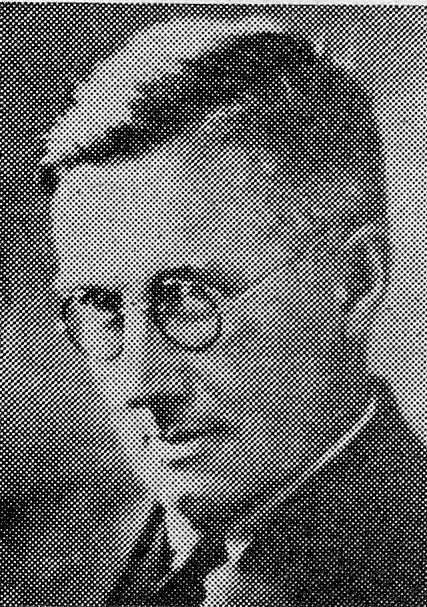Hilary Pepler
 |
Hilary Douglas Clark Pepler comes
of Quaker stock. He was received into the Catholic Church in
1916 and at about that time became a leading member of the famous
Ditchling (Sussex) Catholic Colony of craftsmen and small farmers.
Eric Gill was there too but some years
later broke away. The St. Dominic's Press, with which Pepler's
name is chiefly associated, was established "after His Majesty's
medical advisers had decided that I and a coalheaver were unsuited
to the trade of war'' as Hilary Pepler tells us in an introductory
note to a list of publications issued by the Press. The printing
press used was a handpress. It made his publications distinctive.
Mr. Pepler aimed at being a craftsman and not a mechanic. He
was opposed to mass production and had no ambition to produce
cheap and shoddy work. Pepler 's type was worthy of ranking with
William Morris' Kelmscott Gothic. but was simpler. He also wrote
and published with Gill's illustrations, many spirited, audacious,
and fervent Catholic squibs.
Since "aesthetic minorities
are apt to engender an unhealthy kind of conceit" a chapel
was erected in the centre of the settlement as a corrective.
The members of the community with one or two exceptions were
Dominican tertiaries and at fixed times during the day they left
their work for prayer. Father Vincent McNabb,
the famous Dominican preacher and writer was their Spiritual
Director. The zeal of Gill and Pepler may be judged by the fact
that finding that the Angelus was not rung at Ditchling they
ransacked the by-ways for a worthy bell, and then rang it daily.
During the period of World War
I, it became necessary to do farming. Six hundred acres were
e secured and tilled. ''During 1917 and 1918," wrote Pepler,
"we could have stood a close siege without lack of food."
Soon other crafts were added A weaving shed was set up. Statuary
and cabinet making were undertaken. The community assumed the
proportions of a tiny village.
After Pepler had done all he
set out to do as a printer, he left the press to one of his sons
(another son is a Dominican) and a Distributist friend, and launched
out on a new career. This was only a few year, before World War
II, when Pepler was neatly sixty, lie wrote and produced miming
plays, himself expressing the gamut of the emotions in a nicely
stylised dumbshow and training a company to approach the same
pitch. His triumph was The Field Is Won, a mime of the life of
St. Thomas More, produced at a London theatre not long after
the canonization. He was highly successful with his mimes on
a visit to the United States.
At about the time when he took
on miming in public, he was for short while secretary of the
Distributist League, and went down to Beconsfield to be "knighted"
by Gilbert K. Chesterton with the
famous sword-stick.
Although, no doubt, still ready
to do a job of printing or a job of miming, Pepler has in fact
embarked on a new career. He is a director of The Weekly Review,
a child of G. K.'s Weekly, and a busy member of the editorial
staff, writing on economics and public entertainment. Now and
then he indulges himself with a squib in verse. Since this Weekly
Review is the only independent paper left in England, it may
afford him sufficient outlet for his vast energies.
Hilary Pepler was born at Eastbourne,
borough of Sussex, England, in 1878, and was educated at Bootharn
School, York. In 1905 he married Clare John \Vhiteman. They have
three sons and three daughters.
Stanley B. James said of his
writings: "It is true he is more poet than playwright; I
think there is sometimes a lack of dramatic movement in his compositions.
But the austere beauty of his writing cannot be denied. It is
entirely free from superfluous ornament and sentimentalism. The
intellectual quality is high; the lines are packed almost too
closely with thought."
He is the author of: Justice
and the Child; Care Committees; The Devil's Devices: Pertinent
and Impertinent; Plays for Puppets; The Hand Press, etc. Also
the following mimes: The Passion; St. Joan, and Everyman.
[by William Titteton
and Matthew Hohen. First published in 1948 in Catholic Authors,
St. Mary's Abbey, Newark. Hilary Pepler died in 1951]
|